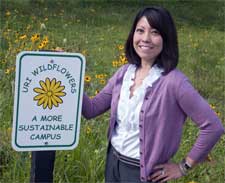 Focus on transportation, education, carbon neutrality
Focus on transportation, education, carbon neutrality
KINGSTON, R.I. – August 15, 2011 – Marsha Garcia is working to send a message to University of Rhode Island students, faculty and staff to be mindful of how their lifestyle affects the health of the planet and to take steps to reduce their carbon footprint.
“To me, it’s a common sense approach to living,” said Garcia, the University’s first sustainability officer, who was hired in May after serving in the position for a year on an interim basis. “We all need to be more mindful of how we live on a daily basis and how that impacts the environment.”
She said the concept of sustainability is difficult to explain, especially to those for whom environmental awareness and concern aren’t on their radar. But it’s a vital lesson to ensure future prosperity.
Issues of sustainability permeate the entire URI campus. Garcia works closely with faculty to infuse sustainability into the curriculum, helps campus planners design green buildings, advocates for more local produce in student dining halls, and creates student leadership programs to train students to be peer advisors about green living.
The job of sustainability officer at URI was created in part to manage the University’s responsibilities under the American College and University Presidents’ Climate Commitment, a document signed by former URI President Robert L. Carothers in 2007, which committed the University to dramatically reduce its contribution to global climate change. Garcia also coordinates the URI President’s Council for Sustainability, a group of faculty, staff and students appointed by President David Dooley who provide strategic guidance on campus sustainability initiatives.
“The University does a great deal to promote sustainability, but it has been somewhat disjointed and it hasn’t come across in a unified way,” Garcia said. “I’ll be working to coordinate our programs related to sustainability and launch new programs.”
While URI has an international reputation for its research on environmental topics, from oceanography and climate change to natural resources and environmental engineering, Garcia said that many of those concepts haven’t been translated into programs and actions that engage the entire campus community.
“It’s a matter of changing the culture on campus,” said Garcia. “A lot of other universities have focused on sustainability longer than we have, so we have some catching up to do. And given the small size of Rhode Island, changing the culture at URI almost involves changing the mindset of the entire state.”
One helpful step in that direction was the University’s choice of No Impact Man as its required reading book for all incoming freshmen. The author of the book, about one man’s yearlong effort to consume as few resources as possible, will speak on campus in September, and Garcia is working with a group of students to develop a series of programs around his visit that she hopes will engage the campus community to embrace the basic principles of sustainability.
Despite the challenge of changing the campus culture, Garcia is enthusiastic about tackling difficult issues, the biggest of which is transportation.
“Transportation affects everyone, it’s the most obvious issue, and fixing it would make the biggest impression and have the biggest impact,” she said. “The public transportation system in Rhode Island is not used very well, and it’s certainly not ingrained in the lifestyle of our students and faculty.”
Few people take the bus or carpool to URI, despite increasing options and incentives to do so. As a result, traffic on Route 138 and through campus at peak hours is gridlocked and complaints about parking are common. Greenhouse gas emissions from transportation, especially single-occupancy vehicles, are especially high and very difficult to mitigate, according to a study by URI Energy Fellows.
Garcia grew up in Pennsylvania but lived in Washington, D.C., while working for the National Wildlife Federation, the U.S. Green Building Council, and the American Institute of Architects before moving to Rhode Island. She said the first thing she did when she got to Providence was figure out how to use public transportation to get to URI, which she uses at least three times per week.
While she said that she is still working to establish her office with “a team of people who are actively and persistently working on sustainability issues on campus,” her main goal is to reduce the University’s carbon footprint.
“I dream of URI reaching carbon neutrality, which seems like an impossible feat,” she admits. “But it’s important that we move in that direction and get everyone to believe that, together, we can get this campus to be as close to zero as possible.”
Pictured above
Marsha Garcia.
URI Department of Communications & Marketing photo by Michael Salerno Photography.

